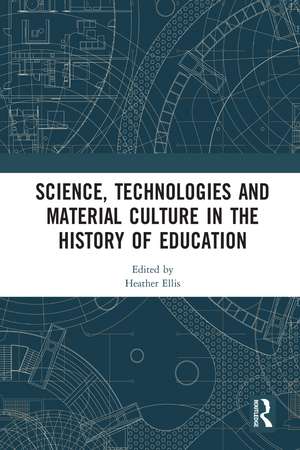Science, Technologies and Material Culture in the History of Education
Editat de Heather Ellisen Limba Engleză Paperback – 30 iun 2020
The contributions to this volume demonstrate the diversity and originality of research currently being conducted into the connections between the history of science and the history of education. The importance of objects in teaching and their value as pedagogical tools emerges as a particularly significant area of research located at the intersection between the two fields of enquiry. Indeed, it is the materiality of education, a focus on the use of objects, pedagogical practices and particular spaces, which seems to offer some of the most promising avenues for exploring further the relationship between the histories of science and education. This book was originally published as a special issue of the History of Education.
| Toate formatele și edițiile | Preț | Express |
|---|---|---|
| Paperback (1) | 367.46 lei 6-8 săpt. | |
| Taylor & Francis – 30 iun 2020 | 367.46 lei 6-8 săpt. | |
| Hardback (1) | 764.20 lei 6-8 săpt. | |
| Taylor & Francis – 6 noi 2018 | 764.20 lei 6-8 săpt. |
Preț: 367.46 lei
Nou
Puncte Express: 551
Preț estimativ în valută:
70.32€ • 72.65$ • 58.53£
70.32€ • 72.65$ • 58.53£
Carte tipărită la comandă
Livrare economică 25 martie-08 aprilie
Preluare comenzi: 021 569.72.76
Specificații
ISBN-13: 9780367583781
ISBN-10: 036758378X
Pagini: 146
Dimensiuni: 174 x 246 x 10 mm
Greutate: 0.25 kg
Ediția:1
Editura: Taylor & Francis
Colecția Routledge
Locul publicării:Oxford, United Kingdom
ISBN-10: 036758378X
Pagini: 146
Dimensiuni: 174 x 246 x 10 mm
Greutate: 0.25 kg
Ediția:1
Editura: Taylor & Francis
Colecția Routledge
Locul publicării:Oxford, United Kingdom
Public țintă
Postgraduate and UndergraduateCuprins
Introduction: science, technologies and material culture in the history of education 1. Science and public understanding: the role of the historian of education 2 ‘All your dreadful scientific things’: women, science and education in the years around 1900 3. Household and domestic science: entangling the personal and the professional 4. Domesticating physics: introductory physics textbooks for women in home economics in the United States, 1914–1955 5. Paper, scissors, rock: aspects of the intertwined histories of pedagogy and model-making 6. Transnational education in the late nineteenth century: Brazil, France and Portugal connected by a school museum 7. Microbial metaphors: teaching ‘familiar science’ at a Kent sanatorium, c.1905–1930 8. Russian dreams and Prussian ghosts: Immanuel Kant Baltic Federal University and debates over historical memory and identity in Kaliningrad
Notă biografică
Heather Ellis is a Vice-Chancellor’s Fellow at the University of Sheffield, UK. Her current research focuses on cultures of knowledge making in Britain in the late 18th and 19th centuries. She is the author of two books: Masculinity and Science in Britain, 1831–1918 (2017); and Generational Conflict and University Reform: Oxford in the Age of Revolution (2012), which was awarded the 2014 Kevin Brehony prize for the best first book by the History of Education Society UK.
Descriere
This book explores the interconnections between the histories of science, technologies and material culture, and the history of education, expressing concern over the extent to which the history of science and technology and the history of education are too frequently written about separately, despite their connections. The contributions to this
